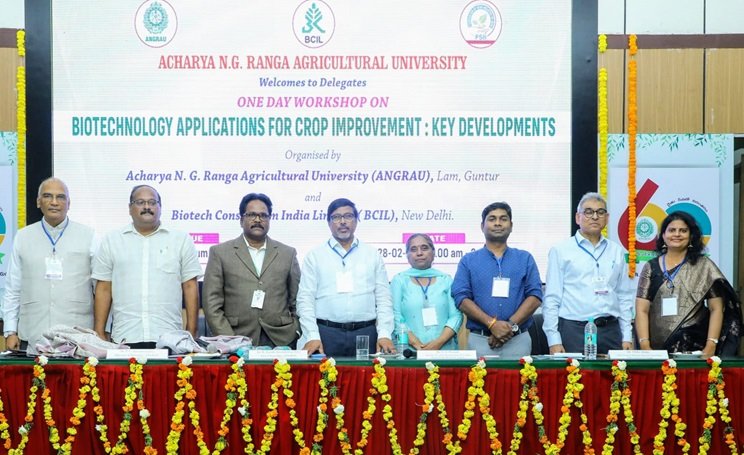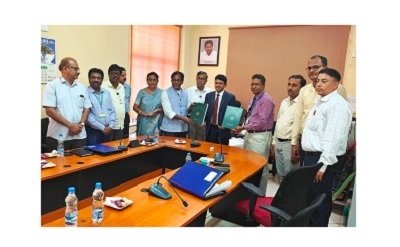AP’s agri and allied sector sets an example by achieving 8.80% CAGR with widespread adoption of biotech
Between 2020 and 2024, the state introduced over 46 innovative rice seed varieties, boosting resilience and productivity, further reinforcing the role of biotechnology in agricultural sustainability.
Calling the Andhra Pradesh growth story in agriculture and allied sector as exemplary, with a Compounded Annual Growth Rate (CAGR) of 8.80 per cent, experts attributed most of this success to the widespread adoption of biotechnology which has boosted agricultural productivity. At a workshop held at the Regional Agricultural Research Station (RARS), Guntur, researchers, experts, and industry leaders discussed advancements in genetic engineering, molecular breeding, and biotechnological innovations for sustainable agriculture.
The workshop was jointly organised by Acharya N.G. Ranga Agricultural University (ANGRAU), Lam, Guntur, and Biotech Consortium India Limited (BCIL), New Delhi, with support from the Federation of Seed Industry of India (FSII).
Water availability will be a major concern for the coastal state of Andhra Pradesh, along with frequent cyclones and flooding. In rice, the largest grown crop, bacterial blight caused by Xanthomonas oryzae pv. Oryzae is a challenge. To combat these challenges, researchers from ANGRAU and ICAR National Institute for Plant Biotechnology, Delhi, have developed MTU 1232, a high-yielding, flood-tolerant rice variety. Between 2020 and 2024, the state introduced over 46 innovative rice seed varieties, boosting resilience and productivity, further reinforcing the role of biotechnology in agricultural sustainability.
Dr R Sarada Jayalakshmi Devi, Vice Chancellor, ANGRAU, reaffirmed the university’s commitment to agricultural research, citing MTU 1232 as a testament to biotechnology’s impact. “ANGRAU has led the development of resilient seed varieties using biotech tools like MTU 1232 developed using the Sub1A gene, withstands flash floods for 10-14 days and stagnant flooding up to 50 cm for over a month. With an 80 per cent survival rate and yields of 3,792 kg/ha under severe floods and 6,000 kg/ha in normal conditions, it is a game-changer for flood-prone regions,” she said.
Biotechnology’s success extends beyond rice to other crops. Andhra Pradesh has been a leader in the adoption of Bt Cotton, with 4,73,345 farmers cultivating it in 2023–24. An ICAR-CICR study found Bt cotton increased yields by 3-4 quintals per acre while reducing pesticide use. Such advancements support sustainable, climate-resilient agriculture.
Ram Kaundinya, Advisor, FSII and Co-founder, AGVAYA, emphasized the role of biotechnology in tackling agricultural challenges. “Biotechnology offers both Transgenic and Non-transgenic solutions. With changing climate conditions and rising productivity demands, biotech innovations are crucial. Bt cotton exemplifies how genetically modified crops boost yields, enhance resilience, and improve livelihoods. Other crops of Andhra Pradesh like Maize, Rice, Chilli, Vegetables, Pulses and Oilseeds can get a big boost with the help of biotechnology” he said.
Dr Vibha Ahuja, Chief General Manager, BCIL, highlighted biotechnology’s transformative impact. “The success of Bt cotton underscores its benefits for farmers. Since the introduction of genetically engineered crops in 1996, yields have improved across maize, soybean, cotton, and canola. Gene editing since 2012 has further accelerated crop improvement, offering faster, more precise solutions. Combined with precision agriculture, these innovations can drive the next wave of progress. These technologies undergo rigorous testing and stringent regulatory studies before they are approved. Farmers and consumers are encouraged to adopt them on a large scale as they are absolutely safe,” she said.
The workshop covered genome editing, pest and disease resistance, soil health, and the economic benefits of biotechnology for smallholder farmers. Experts stressed the importance of investment, policy support, and farmer education to unlock biotechnology’s full potential.
Between 2020 and 2024, the state introduced




